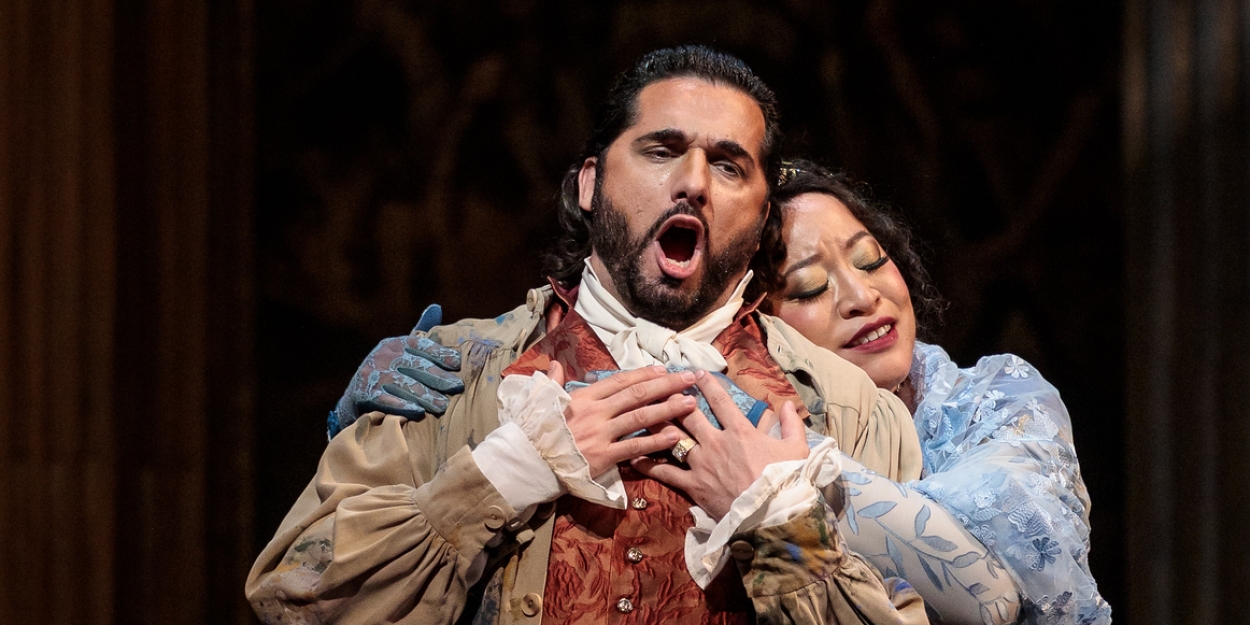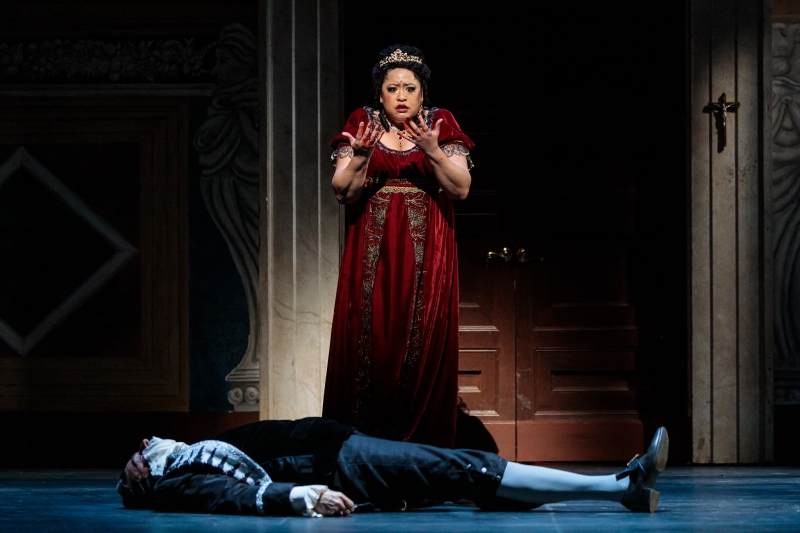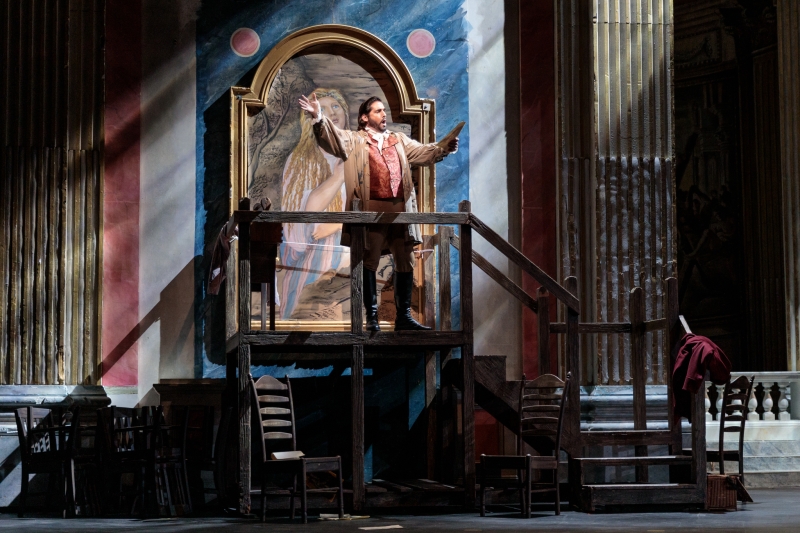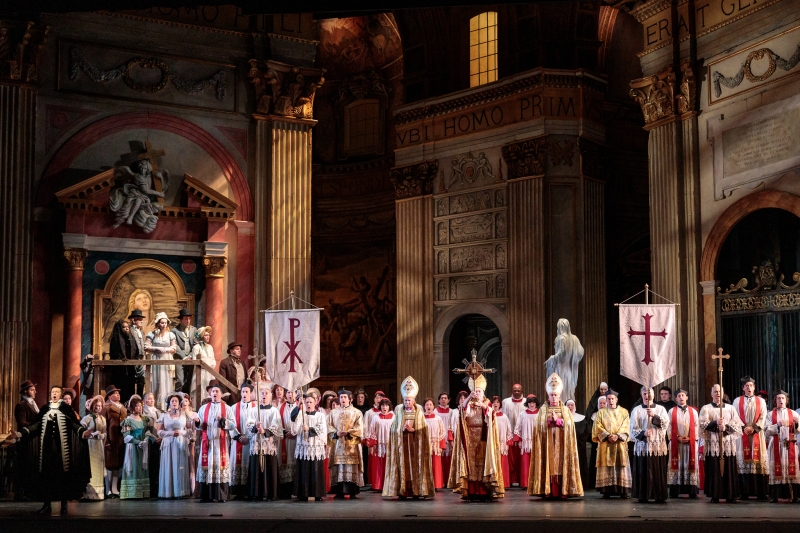Review: SAN DIEGO OPERA'S TOSCA at San Diego Civic Center Theatre
A worldwide favorite in an outstanding production

An impressive set drew applause as the first curtain rose. It was a prophetic herald of the pleasures to follow.
The story begins with a light comedic touch as baritone Michael Sokol (Sacristan) combines his chores with sarcastic complaints about the state of the world, and the singer Flora Tosca's mercurial character is introduced in a jealous spat with her lover, the painter Cavaradossi (tenor Marcelo Puente). The story darkens when Tosca (soprano Michelle

Bradley) exits and Angelotti, an escaped political prisoner played by bass-baritone Andrew Craig Brown, emerges from the church in which he's been hiding and plots his next moves with Cavaradossi. When they exit, chief of the secret police Baron Scarpia (Greer Grimsley) arrives searching for Angelotti. He has a sadistic plan to arrest Cavaradossi for harboring the fugitive and threatening to execute him if Tosca doesn't yield her virtue.
The opera is based on a play by French playwright Victorien Sardou written for Sarah Bernhardt, the most famous actress worldwide in the late 19th and early 20th Centuries. (It was such a huge European success that the incredibly fascinating Bernhard was able to buy a lion she named Scarpia for her growing private menagerie.) When Puccini saw the play with its complex characters embedded in a boiling plot of love, religion, politics, and treachery, he fought to obtain the rights as the basis for the opera that is now one of the world's five most frequently performed.
Soprano Michelle Bradley is a rapidly rising star who played the title role in Verdi's "Aida" here in 2019 and will sing it again a month from now on the stage of the Metropolitan Opera. Her voice is so strong, it soars over a forte orchestra when called upon, yet floats magically to the back of the hall in softer moments as in the opera's most anticipated aria, the second act's "Vissi d'arte" ("I lived for my art").

Argentine tenor Marcelo Puente made his company debut as Tosca's lover. His performance of the famous opening aria, "Recondita armonia," (concealed harmonies) made a compelling case that he should be invited back. And after the audience's reception of the even better-known aria, "e lucevan le stelle" ("The stars were shining"), it was clear he'd be welcome if he did return. Puente matches Bradley with an ability to move smoothly from warm lyricism to power, though in the opening night's first duet the tenor line was a few times only faintly heard against soprano and orchestra.
Like Bradley, bass-baritone Greer Grimsley has made multiple appearances in San Diego, most recently as a delightfully comedic Pirate King in 2017's The Pirates of Penzance. This is
.jpg)
the third time he has sung Scarpia here. It's a role of hypocrisy and commanding evil he sings and acts so well, I'm surprised at least a few from the audience didn't leap to the stage to join in as Tosca palms the knife that will kill him after he cruelly threatens Cavaradossi's life. (In his mostly black, Darth-Vaderish costume as Scarpia, he did garner a few jesting boos when he took his bows at curtain call .)
The San Diego Opera has outdone itself with its most recent production of Puccini's Tosca. The three major roles are sung by appealing voices with exceptional power; the company's chorus and the city's children's choir combined for thrilling moments, especially in the riveting Act I finale; San Diego Symphony musicians excelled under Italian conductor Valerio Galli, caressing the opera's most romantic melodies and offering glowing resonance in its heroic themes. The evening ended with curtain calls that brought an understandably pleased audience to its feet in enthusiastic appreciation of an outstanding entertainment.

Tosca will be staged again on March 31st and April 2nd. Visit the San Diego Opera website for ticket information.
Photos by Karli Cadel
Reader Reviews

Videos

